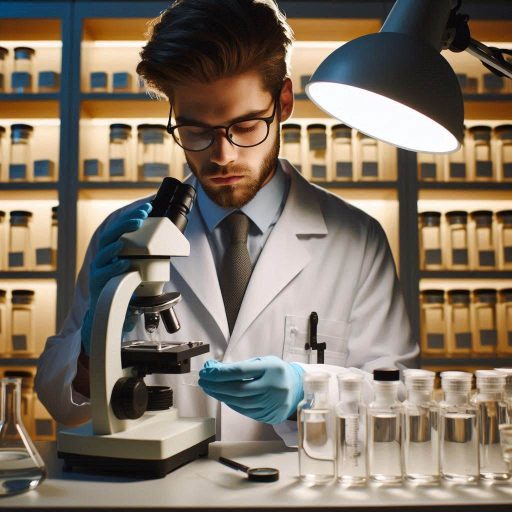Introduction
Forensic science is the application of scientific principles to criminal investigations.
It encompasses various fields, including biology, chemistry, and physics.
Forensic scientists analyze physical evidence to help solve crimes.
This evidence can include DNA, fingerprints, and trace materials found at crime scenes.
The importance of forensic science in criminal investigations cannot be overstated.
It provides crucial information that can establish connections between suspects and crime scenes.
Forensic evidence often serves as the backbone of criminal cases in courtrooms.
The meticulous analysis done by forensic scientists can confirm or refute suspects’ claims, leading to just outcomes.
The demand for forensic science graduates is on the rise.
As crime rates fluctuate and new technologies emerge, law enforcement agencies require skilled professionals.
Advances in DNA analysis and digital forensics have expanded the field significantly.
This growth has led to increased job opportunities across various sectors, including law enforcement, private laboratories, and government agencies.
Forensic science graduates possess a unique skill set that is increasingly valued in today’s job market.
With the continuous evolution of crime-solving techniques, these professionals remain essential.
Pursuing a career in forensic science opens doors to a rewarding path in criminal justice and public safety.
The future looks bright for those entering this dynamic and vital field.
Job Opportunities for Forensic Science Graduates
Forensic science graduates have numerous career paths available to them.
These professionals play a vital role in the criminal justice system.
Various Career Paths Available for Forensic Science Graduates
One popular career choice is a crime scene investigator (CSI).
CSIs work directly at crime scenes, collecting and analyzing evidence.
They often collaborate with law enforcement to solve cases.
Their expertise helps ensure that critical evidence is preserved and documented correctly.
Another common career is that of a forensic scientist.
Forensic scientists conduct lab analyses of evidence collected from crime scenes.
They utilize various scientific methods to identify substances and trace materials.
Their work often requires strong analytical skills and attention to detail.
Forensic scientists provide expert testimony in court, explaining their findings to judges and juries.
This role significantly impacts the outcome of criminal cases.
Forensic psychologists also enjoy promising career prospects.
They assess the mental state of suspects and victims.
Their insights help law enforcement understand criminal behavior.
Forensic psychologists may work in legal settings, providing evaluations for court cases.
They can also work in research, studying the psychology behind criminal activity.
This field combines psychology and law, making it a fascinating career choice for many graduates.
Growth in Job Opportunities in the Field of Forensic Science
The job outlook for forensic science graduates is very encouraging.
The Bureau of Labor Statistics (BLS) projects steady growth in this field.
Increased crime rates and advancements in technology drive the demand for skilled forensic professionals.
As crime-solving techniques evolve, the need for trained experts will grow.
This trend suggests that job opportunities will continue to expand in the coming years.
Different Sectors That Hire Forensic Science Graduates
Various sectors actively hire forensic science graduates.
Law enforcement agencies are among the primary employers.
They require skilled individuals to investigate crimes and analyze evidence.
Government organizations, such as forensic labs and public health departments, also seek forensic professionals.
These organizations need experts to handle cases related to public safety and health issues.
Private companies increasingly hire forensic science graduates as well.
These firms may require forensic specialists to conduct internal investigations or consult on security issues.
Corporations recognize the value of forensic expertise in preventing fraud and ensuring compliance.
This trend opens up additional job opportunities in the private sector.
In review, forensic science graduates have many career options to explore.
They can pursue roles as crime scene investigators, forensic scientists, or forensic psychologists.
The growth in job opportunities within the field is promising, thanks to rising crime rates and technological advancements.
Various sectors, including law enforcement, government, and private companies, actively seek forensic professionals.
As the field continues to expand, graduates will find numerous rewarding career paths to consider.
Read: U.S. Cities with the Most Opportunities for Environmental Scientists
Required Skills and Qualifications for Forensic Science Graduates
A career in forensic science demands a unique blend of skills and qualifications.
Aspiring forensic scientists should focus on developing essential abilities to succeed in the field.
Essential skills needed for a successful career in forensic science (e.g. attention to detail, critical thinking, problem-solving)
Attention to Detail
Forensic scientists must possess a keen eye for detail.
They analyze complex evidence, and even minor oversights can lead to significant errors.
Precision is crucial when documenting findings, collecting samples, or interpreting data.
Employers highly value professionals who consistently demonstrate accuracy in their work.
Critical Thinking
Critical thinking skills are vital in forensic science.
Forensic scientists often face ambiguous situations and must analyze multiple pieces of evidence.
They need to evaluate facts, identify patterns, and draw logical conclusions.
This ability helps them solve complex cases and make sound recommendations based on their findings.
Problem-Solving
Effective problem-solving skills are essential in forensic science.
Forensic professionals frequently encounter unexpected challenges that require innovative solutions.
They must adapt to new information and modify their approaches as needed.
A strong problem-solver can navigate obstacles efficiently and contribute to successful investigations.
Communication Skills
Forensic scientists must communicate effectively, both verbally and in writing.
They often present findings to law enforcement and legal professionals.
Clear communication helps convey complex scientific information to non-experts.
Strong writing skills are essential for preparing comprehensive reports and documenting evidence.
Technical Skills
Technical proficiency is crucial for forensic science careers.
Familiarity with laboratory equipment, software, and analysis techniques is necessary.
Forensic scientists often work with advanced technology for DNA analysis, toxicology tests, and fingerprint examination.
A solid understanding of these tools enhances their effectiveness and accuracy.
Educational Requirements
Most forensic science positions require at least a bachelor‘s degree.
Common degrees include forensic science, chemistry, or biology.
These programs provide foundational knowledge and essential laboratory skills.
Many universities offer specialized coursework that covers topics like forensic biology, toxicology, and crime scene investigation.
Internships during academic studies can provide valuable hands-on experience.
Advanced Degrees
Some positions may require advanced degrees, such as a master’s or Ph.D. Graduates with advanced degrees can pursue specialized roles in forensic pathology, toxicology, or forensic anthropology.
These roles often involve research and higher levels of responsibility.
Additional certifications or licenses that may be required for certain positions in forensic science
Certifications and Licenses
While not always mandatory, certifications can enhance job prospects.
Organizations like the American Board of Criminalistics offer credentials for forensic scientists.
Obtaining certifications demonstrates professional competence and commitment to the field.
Certain positions, such as forensic examiners, may require specific licenses based on state regulations.
A successful career in forensic science requires a mix of essential skills and educational qualifications.
Aspiring professionals should focus on developing their attention to detail, critical thinking, and problem-solving abilities.
By pursuing relevant degrees and certifications, they can position themselves for rewarding careers in this dynamic field.
Read: Environmental Scientist vs. Ecologist: Roles and Differences in the US
Salary and Benefits
Forensic science professionals play a crucial role in the criminal justice system.
Their expertise helps solve crimes and secure convictions.
Understanding the salary and benefits in this field is essential for prospective graduates.
Overview of the Average Salary Range for Forensic Science Professionals
The average salary for forensic science professionals varies depending on their specialization and experience.
According to the Bureau of Labor Statistics (BLS), the median annual wage for forensic science technicians is about $61,000.
Entry-level positions may start around $45,000 annually.
Conversely, experienced forensic scientists can earn upwards of $85,000 or more.
Several factors influence salary levels in forensic science.
Geographic location is a significant determinant.
For instance, urban areas typically offer higher salaries due to the cost of living.
Professionals in states like California and New York tend to earn more compared to those in rural regions.
Additionally, specific roles within forensic science can yield different pay scales.
For example, forensic analysts and crime scene investigators may have varying compensation based on their responsibilities.
Potential for Growth in Salary and Benefits
Salary growth in forensic science is promising.
As professionals gain experience, they often receive pay increases and promotions.
Many employers offer annual raises based on performance evaluations.
In addition, pursuing advanced degrees or certifications can lead to higher salaries.
For example, a forensic scientist with a master’s degree or specialized certification may earn significantly more than a peer without these qualifications.
Additional Perks or Benefits
Moreover, forensic science professionals often enjoy various benefits that enhance their overall compensation package.
Most full-time positions come with health insurance, retirement plans, and paid time off.
These benefits contribute to job satisfaction and financial security.
Many agencies also provide additional perks like tuition reimbursement for further education.
This support encourages continuous professional development.
Job security is another attractive aspect of a career in forensic science.
The demand for skilled forensic professionals remains steady, driven by an increasing focus on criminal investigations.
As crime rates fluctuate, the need for forensic experts persists.
This stability provides peace of mind for those entering the field.
Additionally, forensic scientists often enjoy flexible work hours.
Many positions allow for alternate schedules, accommodating work-life balance.
This flexibility enables professionals to meet personal commitments while fulfilling their job responsibilities.
In essence, the salary and benefits for forensic science graduates present a promising outlook.
With a competitive average salary and potential for growth, a career in this field is rewarding.
The added benefits of job security and flexible hours further enhance its appeal.
As the demand for forensic science professionals continues to rise, so do the opportunities for financial success and personal fulfillment.
and valuable benefits that contribute to a fulfilling professional experience.
Transform Your Career Today
Unlock a personalized career strategy that drives real results. Get tailored advice and a roadmap designed just for you.
Start NowRead: The Relationship Between U.S. Policy & Environmental Scientist Roles

Challenges in the Field
Forensic science offers a rewarding career, but it comes with significant challenges.
Challenges that forensic science professionals may face in their careers (e.g. emotional toll of working on criminal cases, long work hours)
Emotional Toll of Working on Criminal Cases
Forensic professionals often face an emotional toll.
Working on criminal cases exposes them to disturbing evidence and traumatic stories.
This constant exposure can lead to burnout and mental health issues.
Understanding the emotional aspects of their work is vital for maintaining well-being.
Long Work Hours
Long work hours also add to the stress.
Forensic professionals frequently work overtime to meet tight deadlines.
They may be called to crime scenes at odd hours, disrupting their personal lives.
This unpredictability can strain relationships and impact overall well-being.
Balancing work and personal time is essential for a sustainable career.
Obstacles to Advancement in the Field
The forensic science field is highly competitive.
As forensic science gains popularity, more graduates enter the job market.
This influx can make it difficult for newcomers to secure positions.
Experienced professionals may face pressure to continuously improve their skills and stay updated on advancements in technology.
Moreover, the field requires a broad knowledge base.
Professionals must understand various disciplines, including biology, chemistry, and criminal justice.
This requirement can be overwhelming for those just starting their careers.
Keeping up with evolving technologies and methodologies can pose additional challenges.
Tips to Overcome Challenges
To overcome these obstacles, aspiring forensic scientists can take several proactive steps.
First, they should seek internships or volunteer opportunities.
Gaining hands-on experience in real-world settings can enhance their resumes and provide valuable networking connections.
Building relationships with experienced professionals can open doors to job opportunities and mentorship.
Second, ongoing education is crucial.
Forensic science constantly evolves, making continuing education vital for career advancement.
Professionals should attend workshops, conferences, and seminars to stay updated on the latest techniques and technologies.
This commitment to learning improves skills and enhances job security.
Third, mental health awareness is essential.
Forensic scientists should prioritize self-care to mitigate the emotional toll of their work.
Engaging in stress-reducing activities, such as exercise or mindfulness practices, can improve overall well-being.
Establishing a strong support network with colleagues can provide emotional assistance during tough times.
Lastly, professionals should be open to career development opportunities.
Seeking certifications and additional qualifications can enhance expertise and marketability.
Forensic scientists should remain adaptable and willing to embrace new roles within the field.
This flexibility can lead to new career paths and advancement opportunities.
To sum it all up, while forensic science offers a fulfilling career, professionals must navigate various challenges.
By actively pursuing internships, committing to ongoing education, prioritizing mental health, and seeking growth opportunities, forensic scientists can thrive in their careers.
With determination and resilience, they can overcome obstacles and make a meaningful impact in the field.
Read: Organizations & Associations for Environmental Scientists in the USA
You Might Also Like: Key Research Areas in Modern Virology
Networking and Professional Development for Forensic Science Graduates
Importance of Networking with Other Professionals in the Field of Forensic Science
Networking plays a vital role in building a successful career in forensic science.
Connecting with other professionals opens doors to new opportunities and knowledge sharing.
By engaging with colleagues and mentors, you can gain insights into the latest trends and practices in the field.
This collaboration fosters a supportive environment where you can thrive.
Attending Conferences, Workshops, and Seminars to Stay Current in the Field
Attending conferences, workshops, and seminars is crucial for staying current in forensic science.
These events provide a platform to learn from experts and hear about new research.
Participate in workshops that offer hands-on training and skill development.
Seminars often showcase cutting-edge techniques and advancements in forensic technologies.
Regularly attending these events helps you stay informed and relevant in a fast-evolving field.
Many professional organizations host annual conferences that bring together industry leaders and researchers.
Consider joining associations like the American Academy of Forensic Sciences (AAFS) or the International Association for Identification (IAI).
These organizations offer access to a wealth of resources, including publications and networking opportunities.
Actively participate in their events to meet peers and potential employers.
Building a Strong Professional Network and Seeking Mentorship from Experienced Forensic Science Professionals
Building a strong professional network is essential for your career growth.
Start by connecting with your classmates, professors, and industry professionals.
Use social media platforms like LinkedIn to expand your network.
Join relevant groups and engage in discussions related to forensic science.
Share your knowledge and insights to establish yourself as a valuable member of the community.
Seek mentorship from experienced forensic science professionals.
A mentor can provide guidance on career paths, job search strategies, and skill development.
Look for mentors at your university, in professional organizations, or through networking events.
Building a relationship with a mentor can significantly enhance your professional growth.
They can offer advice based on their experiences and help you navigate challenges in your career.
Don‘t hesitate to reach out to professionals you admire.
Ask for informational interviews to learn about their career journeys.
Be respectful of their time and come prepared with thoughtful questions.
Many professionals are willing to share their insights and may even become valuable contacts in your network.
Stay proactive in your networking efforts.
Regularly follow up with your contacts and express your appreciation for their support.
Attend local meetups or workshops to build relationships within your community.
Establishing and maintaining these connections will provide a strong foundation for your career in forensic science.
By prioritizing networking and professional development, you will enhance your job prospects and contribute to the advancement of the field.
Embrace every opportunity to learn, connect, and grow.
Job Search Tips for Forensic Science Graduates
Strategies for Finding Job Opportunities in Forensic Science
Finding a job in forensic science can be challenging but rewarding.
Graduates should leverage various strategies to uncover job opportunities.
Start by exploring job boards that specialize in forensic science roles.
Websites like Indeed, LinkedIn, and Glassdoor frequently list openings in this field.
Additionally, consider niche job boards, such as the International Association for Identification’s job board.
These sites cater specifically to forensic professionals and can help narrow your search.
Joining professional organizations can also enhance your job search.
Associations like the American Academy of Forensic Sciences (AAFS) and the International Association for Identification (IAI) provide access to job postings and networking events.
Membership often comes with resources that can help you stay informed about industry trends and job openings.
Attend conferences and workshops hosted by these organizations to meet potential employers and fellow graduates.
Networking in these environments can open doors to unadvertised job opportunities.
Tips for Building a Strong Resume and Cover Letter Specifically Tailored to Forensic Science Positions
When applying for positions, tailor your resume and cover letter to forensic science roles.
Highlight relevant coursework, internships, and any practical experience related to forensic science.
Use action verbs to describe your accomplishments.
For instance, instead of saying, “Responsible for collecting evidence,” say, “Collected and analyzed evidence in various criminal cases.
” This approach demonstrates your active involvement and contributions.
Your cover letter should complement your resume by showcasing your passion for forensic science.
Address the specific skills mentioned in the job description.
For example, if the position emphasizes analytical skills, provide examples of your analytical work during internships or coursework.
Show how your experiences align with the organization’s goals.
Importance of Preparing for Interviews and Highlighting Relevant Experience and Skills
Preparing for interviews is crucial to success in securing a job in forensic science.
Research the organization thoroughly before your interview.
Understand their values, recent cases, and any challenges they face.
This knowledge will enable you to ask insightful questions and demonstrate your genuine interest in the role.
During the interview, highlight your relevant experiences and skills.
Prepare specific examples that showcase your problem-solving abilities, teamwork, and technical expertise.
Forensic science often involves collaboration, so emphasize your ability to work effectively with others.
Additionally, practice answering common interview questions related to forensic science, such as your approach to evidence analysis or how you handle ethical dilemmas in the field.
Finally, follow up after your interview with a thank-you note.
Express your appreciation for the opportunity and reiterate your interest in the position.
A thoughtful follow-up can leave a lasting impression and enhance your chances of being hired.
By actively utilizing job boards, networking, and tailoring your application materials, you can position yourself for success in the forensic science job market.
You Might Also Like: Field Equipment Every Botanist Should Have
Conclusion
The career outlook for forensic science graduates remains highly promising.
The demand for skilled professionals in this field is steadily increasing.
As technology advances, the role of forensic scientists becomes more crucial in solving crimes and ensuring justice.
Many agencies seek graduates who can apply scientific techniques to real-world investigations.
Forensic science offers diverse career paths, from crime scene investigation to lab analysis.
Graduates can work in law enforcement, private labs, or government agencies.
The combination of scientific knowledge and analytical skills makes forensic scientists invaluable in the criminal justice system.
As crime rates and legal complexities rise, the need for forensic experts grows.
Pursuing a career in forensic science can lead to a fulfilling and impactful profession.
Many universities now offer specialized programs and degrees in forensic science, making education accessible for aspiring professionals.
For readers interested in this field, numerous resources are available.
Organizations such as the American Academy of Forensic Sciences provide valuable information and networking opportunities.
Career fairs and workshops also help connect graduates with potential employers.
Consider exploring internships to gain hands-on experience and build your resume.
In general, a career in forensic science not only offers stability but also the chance to make a difference in society.




